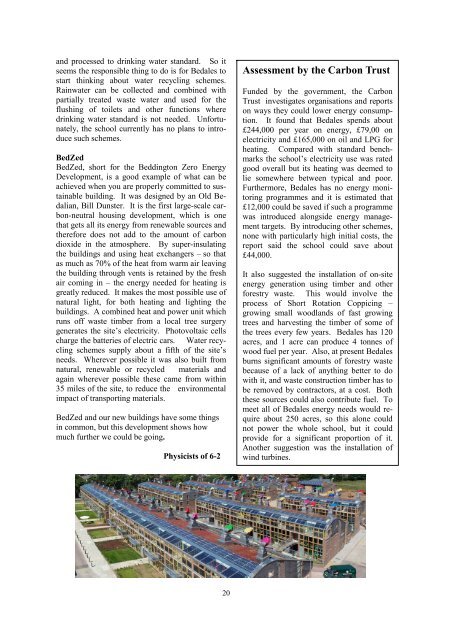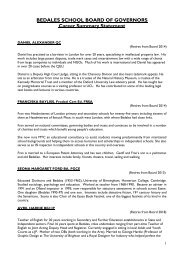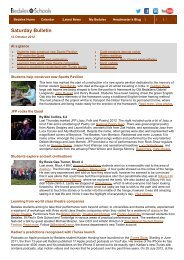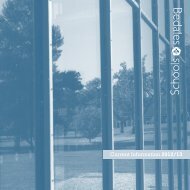You also want an ePaper? Increase the reach of your titles
YUMPU automatically turns print PDFs into web optimized ePapers that Google loves.
and processed to drinking water standard. So itseems the responsible thing to do is for <strong>Bedales</strong> tostart thinking about water recycling schemes.Rainwater can be collected and combined withpartially treated waste water and used for theflushing of toilets and other functions wheredrinking water standard is not needed. Unfortunately,the school currently has no plans to introducesuch schemes.BedZedBedZed, short for the Beddington Zero EnergyDevelopment, is a good example of what can beachieved when you are properly committed to sustainablebuilding. It was designed by an Old Bedalian,Bill Dunster. It is the first large-scale carbon-neutralhousing development, which is onethat gets all its energy from renewable sources andtherefore does not add to the amount of carbondioxide in the atmosphere. By super-insulatingthe buildings and using heat exchangers – so thatas much as 70% of the heat from warm air leavingthe building through vents is retained by the freshair coming in – the energy needed for heating isgreatly reduced. It makes the most possible use ofnatural light, for both heating and lighting thebuildings. A combined heat and power unit whichruns off waste timber from a local tree surgerygenerates the site’s electricity. Photovoltaic cellscharge the batteries of electric cars. Water recyclingschemes supply about a fifth of the site’sneeds. Wherever possible it was also built fromnatural, renewable or recycled materials andagain wherever possible these came from within35 miles of the site, to reduce the environmentalimpact of transporting materials.BedZed and our new buildings have some thingsin common, but this development shows howmuch further we could be going.Physicists of 6-2Assessment by the Carbon TrustFunded by the government, the CarbonTrust investigates organisations and reportson ways they could lower energy consumption.It found that <strong>Bedales</strong> spends about£244,000 per year on energy, £79,00 onelectricity and £165,000 on oil and LPG forheating. Compared with standard benchmarksthe school’s electricity use was ratedgood overall but its heating was deemed tolie somewhere between typical and poor.Furthermore, <strong>Bedales</strong> has no energy monitoringprogrammes and it is estimated that£12,000 could be saved if such a programmewas introduced alongside energy managementtargets. By introducing other schemes,none with particularly high initial costs, thereport said the school could save about£44,000.It also suggested the installation of on-siteenergy generation using timber and otherforestry waste. This would involve theprocess of Short Rotation Coppicing –growing small woodlands of fast growingtrees and harvesting the timber of some ofthe trees every few years. <strong>Bedales</strong> has 120acres, and 1 acre can produce 4 tonnes ofwood fuel per year. Also, at present <strong>Bedales</strong>burns significant amounts of forestry wastebecause of a lack of anything better to dowith it, and waste construction timber has tobe removed by contractors, at a cost. Boththese sources could also contribute fuel. Tomeet all of <strong>Bedales</strong> energy needs would requireabout 250 acres, so this alone couldnot power the whole school, but it couldprovide for a significant proportion of it.Another suggestion was the installation ofwind turbines.20
















